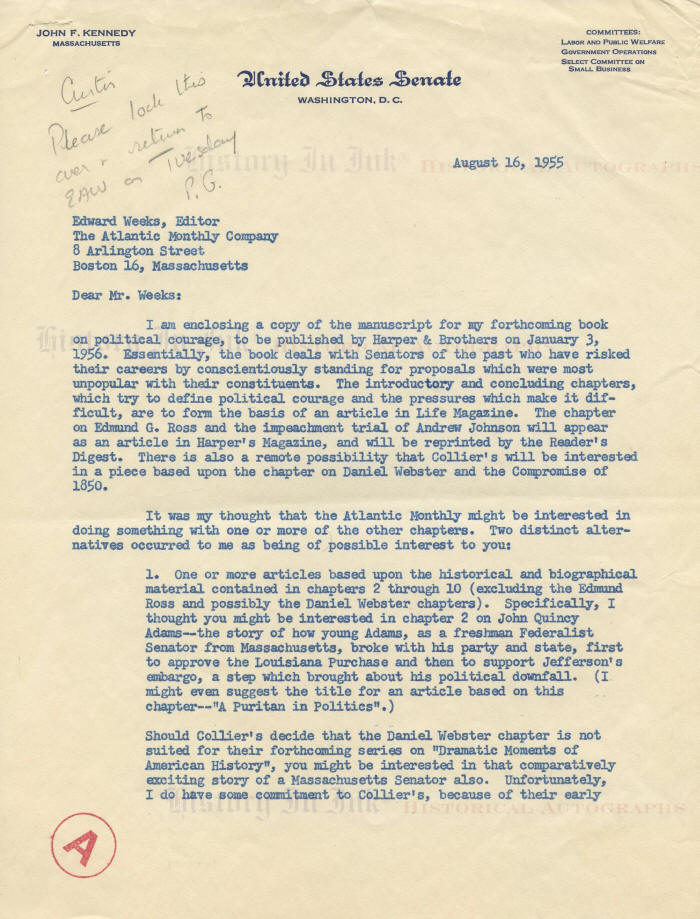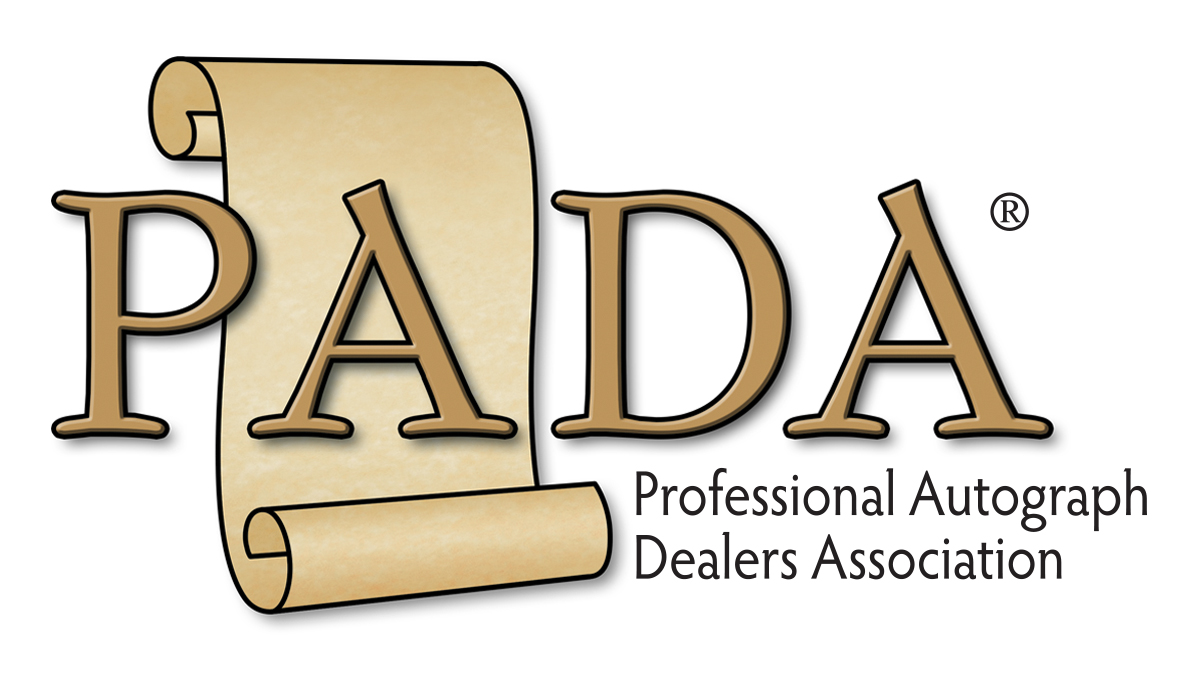1112003
[John F. Kennedy]
Scroll down to see images of the item below the description
Never before offered for sale:
Kennedy seeks to have The Atlantic Monthly publish an excerpt from his “forthcoming book,” Profiles in Courage
[John Fitzgerald Kennedy, 1917–1961. 35th President of the United States, 1961–1963.] Typed letter with likely secretarial signature, John F. Kennedy, two pages, 8” x 10½”, on stationery of the United States Senate, Washington, D.C., August 16, 1955.
In this letter, which has never been offered for sale on the autograph market before, Kennedy seeks to promote his “forthcoming book on political courage,” which would become Profiles in Courage, by offering part of it for advance publication by The Atlantic Monthly. He writes to its editor, Edward Weeks, to send a copy of his manuscript (not included) and to suggest what The Atlantic Monthly might publish in light of other parts of the book that Kennedy had already committed to other publications:
I am enclosing a copy of the manuscript for my forthcoming book on political courage, to be published by Harper & Brothers on January 3, 1956. Essentially, the book deals with Senators of the past who have risked their careers by conscientiously standing for proposals which were most unpopular with their constituents. The introductory and concluding chapters, which try to define political courage and the pressures which make it difficult, are to form the basis of an article in Life Magazine. The chapter on Edmund G. Ross and the impeachment trial of Andrew Johnson will appear as an article in Harper’s Magazine, and will be reprinted by the Reader’s Digest. There is also a remote possibility that Collier’s will be interested in a piece based upon the chapter on Daniel Webster and the Compromise of 1850.
It was my thought that the Atlantic Monthly might be interested in doing something with one or more of the other chapters. Two distinct alternatives occurred to me as being of possible interest to you:
1. One or more articles based upon the historical and biographical materials contained in chapters 2 through 10 (excluding the Edmund Ross and possibly the Daniel Webster chapters). Specifically, I thought you might be interested in chapter 2 on John Quincy Adams—the story of how young Adams, as a freshman Federalist Senator from Massachusetts, broke with his party and state, first to approve the Louisiana Purchase and then to support Jefferson’s embargo, a step which brought about his political downfall. (I might even suggest the title for an article based on this chapter—“A Puritan in Politics”.)
Should Collier’s decide that the Daniel Webster chapter is not suited for their forthcoming series on “Dramatic Moments of American History”, you might be interested in that comparatively exciting story of a Massachusetts Senator also. Unfortunately, I do have some commitment to Collier’s, because of their early expression of interest, to permit them first opportunity to use this material. The stories of Sam Houston and particularly Thomas Hart Benton are among the others which you may find of possible interest.
2. An entirely different alternative would be an article on the rise and fall of the Senate in terms of its power, prestige, and color, based upon the material contained in the several prologues you will find in the attached manuscript.
I certainly appreciate your kind consideration of this material. Inasmuch as some interest in these chapters has been expressed by other publications, I would be most appreciative if you could let me know your decision at your earliest convenience.
Profiles in Courage was vastly important to Kennedy. At age 38 in 1955, he was still young. Combined with the success of his Harvard senior thesis-turned-book, Why England Slept, which theorized about England’s lack of preparedness at the start of World War II, Profiles in Courage gave Kennedy a more mature image, one that would lead voters to view him as a stronger candidate when he sought higher office. As one Kennedy biographer wrote, Profiles “gave him the stamp of seriousness and even wisdom that Americans saw as invaluable in meeting difficulties abroad and at home.” Robert Dallek, An Unfinished Life: John F. Kennedy 1917–1963, at 210 (2003).
For Kennedy, though, it was personal as much as professional. In 1953, he had told author Margaret Coit that he “would rather win a Pulitzer Prize than be President of the United States.” Using his father’s influence and wealth, JFK actively campaigned for the Pulitzer Prize. Undoubtedly the pre-publication release of excerpts from the book, as Kennedy sought to do with this letter, was part of the publicity campaign. Kennedy pressured his editor to date the book’s release to December 1955, in time for the 1956 Pulitzer. The editor demurred, and the book was released as planned in January 1956. So in January 1957, Kennedy sent his father a list of the members of the Advisory Board for the Pulitzer Prize, obviously enlisting Joseph P. Kennedy’s help. The elder Kennedy in turn arranged for his friend Arthur Krock, the New York Times’ retired Washington Bureau Chief who had served on the Pulitzer Advisory Board, to lobby the board for Profiles in Courage. It worked, and JFK won the 1957 Pulitzer Prize for biography or autobiography.
Of course, winning the Pulitzer Prize boosted Kennedy politically as well. Polls showed that in the four months after the Pulitzer Prize announcement, with nothing else changed, Kennedy’s lead over his nearest competitor for the 1960 Democratic presidential nomination jumped from 3% to 12%. David R. Stokes, JFK’s Ghost: Kennedy, Sorensen, and the Making of Profiles in Courage 283 (2021). Had he won the Pulitzer in 1956, Kennedy might have gotten the Democratic Party nomination for Vice President with Adlai Stevenson, who lost in a landslide to the popular incumbent President Dwight D. Eisenhower, who carried 41 of the 48 states. JFK later recognized that the vice presidential nomination in 1956 would have doomed his subsequent political career. See Rose Fitzgerald Kennedy, Times to Remember 303 (1974).
Kennedy conceived the book when he was hospitalized after having back surgery in December 1954. He used his hospitalization to avoid voting on the Senate’s censure of Wisconsin Senator Joseph R. McCarthy, a Republican—and a Kennedy family friend for whom JFK’s brother, Bobby, had worked—who gained national prominence in February 1950 when he charged that he had a list of “members of the Communist Party and members of a spy ring” employed at the State Department. Almost from the start, there were rumors that Kennedy did not actually write Profiles in Courage, and years later his aide Ted Sorensen, who wrote many of Kennedy’s major speeches during his presidency, claimed that he wrote most of the book and acknowledged that Joseph P. Kennedy had paid him to keep quiet about it. See Stokes, supra, at 286–95. Another of JFK’s biographers concluded, however, that “the senator was responsible for the book’s architecture, themes, and arguments” and that Sorensen, “gifted though he was in so many ways, didn’t have that capacity” because, “at twenty-seven and with no personal political experience, he was too green, and moreover he knew far less about the details of U.S. history than did his boss.” Fredrik Logevall, JFK: Coming of Age in the American Century, 1917–1956, at 594 (2020).
In the end, Profiles in Courage helped Kennedy win the presidency, and the rest is history.
As important as Profiles in Courage was to Kennedy, it seems odd that he would not sign this letter himself. By the time he wrote it, he was no longer hospitalized or debilitated from the second back surgery that he underwent earlier in 1955. Yet, as with many of his Senate-era letters, this one is not signed by him, but for him. The letter possibly bears an Autopen signature, but the signature does not match any of the known Autopen patterns. If it is an Autopen signature, it is a new and, so far, unique pattern never before identified. See Charles Hamilton, The Robot That Helped to Make a President 12–19 & separate addendum (1965) (illustrating seven patterns); Paul K. Carr, John F. Kennedy: Autographs From the Presidency (2002) (crediting Hamilton but illustrating eight patterns); Andreas Wiemer, John F. Kennedy Autograph Study 81–84 (2d ed. 2023) (illustrating 12 patterns). More likely, this is a shaky secretarial effort to trace or copy Kennedy’s printed free frank that appeared on his Senate envelopes. It is especially close to the printed free frank that Wiemer illustrates as # 240. Id. at 86.
The letter has internal Atlantic Monthly pencil notes in the upper left corner of the first page directing someone to review the letter and presumably the manuscript and return them to Weeks. There are staple holes and a small pinhole at the upper left of both pages, not touching any of the printed letterhead or the text. There is a red stamped “A” in a circle at the lower left of both pages, presumably an Atlantic Monthly marking, and there are a few handling marks at the tops and bends in the upper right corners of both pages. Overall, the letter is in fine condition.
This is an outstanding letter. It would be even more outstanding had JFK himself signed it. Still, it expresses his thoughts, shows his efforts to promote Profiles in Courage, and likely represents part of his plan to influence the Pulitzer Prize board. It is brand new on the autograph market and is worthy of the finest JFK collection.
Unframed.








